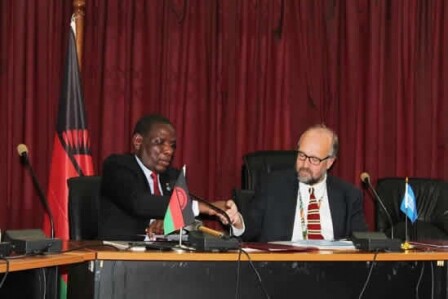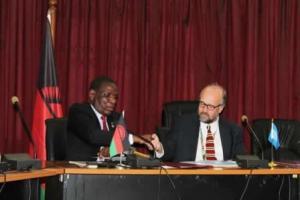
The World Bank has given the Peter Mutharika administration K68 billion to be used for improving quality of education.
Government of Malawi and the World Bank have signed a MK68 billion financing agreement for the Equity with Quality and Learning at Secondary School project (dubbed EQUALS) to be implemented in 13 districts in the country.

This is a project that aims at improving quality of science and mathematics teaching in Community Day Secondary Schools (CDSSs) and increase the number of students accessing secondary education especially in selected remote areas.
Speaking during the signing ceremony in Lilongwe, Finance Minister Joseph Mwanamvekha said this is a milestone in government’s attempts in improving standards of education in Malawi, especially in rural setups.
“There are a number of gaps with regard to quality and standards of education in the country. For example, if you look at the pass rate of science subjects; you will see there are challenges amongst female learners and even some teachers have challenges teaching these subjects.
“The coming in of this project will address these issues by upgrading classrooms and providing books, laboratories and libraries because these are the things we need to address if we are to improve the quality of education,” he said.
Mwanamvekha said the 13 districts were chosen basing on the composite index that was conducted by the Ministry of Education (MoE) with the MSCE pass rate as the proxy.
The districts that performed poorly were the ones which were selected into the project.
“We expect to increase this number to fifteen districts but this will depend on the availability of resources and our performance because there is a performance criterion that has been set up,” he said.
He however, said these are huge resources which if used properly will help students and Malawi as a whole.
“As such, let me thank the World Bank for this and extend my assurance that the money given to this project will be used for intended purposes under existing relevant rules and regulations,” said Mwanamvekha.
To be implemented by the MoE, the project has three components of improving access to education, quality of education and governance which incorporates project implementation, monitoring and evaluation.
The project is targeting around 500 000 secondary education students of whom 320 000 will be from CDSSs.
3000 secondary school teachers of mathematics and sciences, heads and deputy teachers as well as 800 secondary school teacher trainees are also expected to benefit from the project.
The project also targets at improving the quality of education in the four national secondary schools of Mzuzu, Lilongwe, Blantyre and Dedza.
In his remarks, World Bank country Manager, Greg Toulmin said sustainable investment in secondary education offers several critical elements for Malawi’s socio-economic transformation saying investing in secondary education has great potential to improve Malawi’s Human Capital Index.
Toulmin said economic benefits from secondary education are at 67 percent for secondary compared to 15 percent of primary education and the benefits among females is at 85 percent against 58 percent in males.
He also said there are lower multidimensional levels of poverty for those with secondary education, and mothers with secondary education have fewer children and the median age of first birth is 20.7 compared to 18.6 for those with primary education.
However, Toulmin said improving access to and quality of education is essential if Malawians are going to ensure that they play their part in the modern world.
“Increasingly, what we are seeing is the world that needs people to have strong skills and to be well educated in order to realize the benefits of the modern world. As such, secondary education and more access to it is a way to help Malawians gain these skills,” he said.
Source: Mana















APM amamukonda mayiko ose osati mbuzi zina zi
Partying money for dpp and enjoy it with police and management not for malawian and why form 2 exams is out in Malawi.